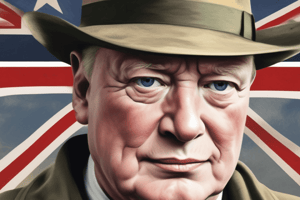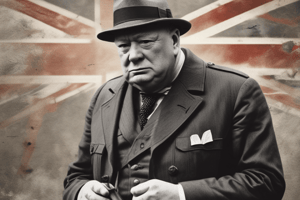Podcast
Questions and Answers
Who was Winston Churchill?
Who was Winston Churchill?
British Prime Minister who opposed appeasement and led Great Britain through WW2.
What is appeasement?
What is appeasement?
- Giving into aggressive demands to maintain peace (correct)
- Starting a civil war
- Act of preparing for war
- Joining military alliances
What does Lebensraum mean?
What does Lebensraum mean?
Living Space
What was Anschluss?
What was Anschluss?
Which countries were part of the Axis Powers?
Which countries were part of the Axis Powers?
What sparked the Spanish Civil War?
What sparked the Spanish Civil War?
The German-Soviet Nonaggression Pact was a public agreement.
The German-Soviet Nonaggression Pact was a public agreement.
What date did Germany invade Poland, marking the outbreak of WW2?
What date did Germany invade Poland, marking the outbreak of WW2?
What does Blitzkrieg mean?
What does Blitzkrieg mean?
What was Vichy France?
What was Vichy France?
Who were the Allied Powers?
Who were the Allied Powers?
What is isolationism?
What is isolationism?
Flashcards are hidden until you start studying
Study Notes
Winston Churchill
- British Prime Minister during WWII, opposing appeasement and motivating the British people against Hitler.
- Led Britain through critical events, including the London Bombings, strengthening morale.
- Collaborated with Roosevelt, ultimately leading the Allies to victory and ending the war.
Appeasement
- Strategy of conceding to aggressive powers to maintain peace, notably utilized by Neville Chamberlain with Hitler.
- Chamberlain's acquiescence to Hitler's claim over Czechoslovakia at the Munich Conference was heavily criticized by Churchill.
- This policy emboldened Hitler's military ambitions, leading to the outbreak of WWII after violating the Treaty of Versailles.
Lebensraum
- Term meaning "Living Space," used by Hitler to justify Germany's territorial expansion.
- Neighboring countries feared invasion but hesitated due to the recent memories of WWI.
Anschluss
- Refers to the annexation of Austria by Germany in 1938, driven by public support and the potential for German military force.
- Showcased Hitler's disregard for the Treaty of Versailles, enhancing his confidence for further conquests.
Axis Powers
- Alliance of aggressive totalitarian regimes: Germany, Italy, and Japan.
- Contributed to the war against the Allied Powers, resulting in an estimated 38 million deaths during the conflict.
Spanish Civil War
- Conflict between Nationalists (led by Francisco Franco) and Republicans following leftist coalition elections in Spain.
- Germany and Italy provided military support to Franco, while the USSR backed the Republicans.
- Franco's victory established a fascist regime in Spain, aligning with Axis powers.
German-Soviet Nonaggression Pact
- Secret agreement between Hitler and Stalin to divide Poland and refrain from attacking each other.
- This pact was later broken by Hitler, proving his untrustworthiness and escalating tensions between Germany and the Soviet Union.
September 1, 1939
- Marks the invasion of Poland by Germany, signifying the official start of WWII.
- The Molotov-Ribbentrop Pact facilitated this invasion, leading Britain and France to declare war too late to prevent escalation.
Blitzkrieg
- Meaning "Lightning War," a rapid German military strategy combining air assaults with quick ground troop movements.
- Employed successfully against Poland and other nations, with London notably surviving the initial Blitzkrieg assaults.
Vichy France
- Represents the regime in southern France during German occupation.
- Demonstrated that Germany could not control all aspects of France, influencing the broader dynamics of the war.
Allied Powers
- Formed after Britain and France declared war on Germany following the invasion of Poland.
- Eventually included the United States after the entry into the war post-Pearl Harbor.
Isolationism
- A policy aimed at remaining disengaged from international conflicts, particularly popular in the U.S. after WWI.
- Isolationism persisted until the Pearl Harbor attack prompted U.S. involvement in WWII.
Studying That Suits You
Use AI to generate personalized quizzes and flashcards to suit your learning preferences.




